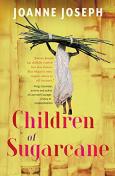
by Joanne Joseph
Kindle Edition- $10.99
Click on the ORANGE Amazon Button for Book Description & Pricing Info
Overall rating:
How would you rate this book?
Member ratings
Children of the Sugarcane, Joanne Joseph
One can’t read this book without a heavy heart. The idea that people were so poorly treated and thought of, prevented from learning and advancing in society because of their station in life and/or religious beliefs, is deplorable. The idea that these conditions exist, even today, in many parts of the world is equally depraved. Covering about four decades, from 1878-1916, the reader is introduced to the world of the indentured servant, the methods used to recruit them, the lives they were forced to live once brought to their place of work, and the abuses they faced and were forced to submit to for their agreed term of service. This information lights a fire on every page.
Although, at first, the book seems to be about two parallel lives, one a mother and the other a daughter, it is really about how the mother’s traumatic life affected the life of the daughter, Raksha. Raksha’s mother, Shanti, left home at age 14, to avoid an arranged marriage to a cousin she did not wish to marry. A forged document attesting to her age as 16, allowed her to sign on to become an indentured servant for the British Empire at one of their sugarcane plantations in Port Natal, South Africa. She left Vakkaruti, her village in India, hoping to return in five years with enough money to make her parents secure and to enable them to forgive her for betraying them by running away after she had promised to marry. She had no idea what hardships awaited her. Naïve and alone, she was often traumatized by the brutality and the secrets she discovered.
When, after a charge of murder, for which she fully expected to be executed, because of a biased and unfair justice system that existed for people like her, she unexpectedly returned to India where she lived a solitary life. She became a teacher and educated those children considered unnecessary to educate by the British. She taught the rudiments of reading, writing and math, as she had been taught by Aunty Saras and Father John, in order to help them advance their position in life. She returned home with a child, Raksha, and raised her alone. She too, became a teacher, but when Raksha grew up and unexpectedly fell in love with an Englishman, her mother fell ill from the shock. After reading her mothers’s diary, she learned of the horrors Shanti had experienced and then alternately loved and hated her for keeping so many secrets from her. Shanti’s life was hard and cruel on the plantation, but she worked hard and made friends. She was betrayed and she was befriended, both with equal measure. When Raksha came to understand why her mother was so traumatized by her sweetheart, David, she thought she might be able to forgive her.
The resolution of the novel, after several decades of secrets are discovered, is somewhat like a fairy tale and often requires the suspension of disbelief. Shanti was far more mature than her mere 14 years, and even when she returned, she was still young and seemed more literate and knowledgeable than was logical for her position in life and her experiences. Still, the story is captivating as it illustrates the arrogance of the English towards their servants and their over important images of themselves. It reveals the great courage and determination of those seeking to better themselves and the lives of their family members. It is a story about immigration and being an outsider looking in, often without the tools to decipher what they are witnessing.
Despite the faults, this is a story crying out to be read. The breadth and depth of Shanti’s experiences expose the value of friendship and love across a broad range of relationships. Samuel Von Pufendorf, in 1673, wrote “More inhumanity has been done by man himself than any other of natures’s causes,” and it still remains true today in many parts of the world.
Book Club HQ to over 90,000+ book clubs and ready to welcome yours.
Get free weekly updates on top club picks, book giveaways, author events and more








